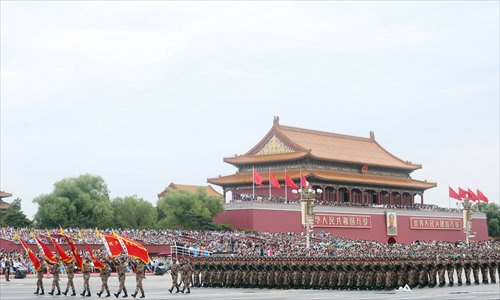
Soldiers march through Tiananmen Square on August 23 during a parade rehearsal. Photo: Cui Meng/GT
Many American policy elites are debating how the country should react to China's rise. Some are confused about China's intentions because of its assertiveness. Many argue the U.S. should accommodate China's rise and shape China's choices, while others suggest that strengthening economic ties is the best way to manage disagreements.
It's an alarming tale: Chinese politicians are engaged in a secret and ambitious plan called the "Hundred-Year Marathon," which aims to allow China to topple the U.S. as global hegemon in economic, military and political terms by 2049, the 100th anniversary of the founding of People's Republic of China. To achieve this goal, in the last 40 years or so, China has been seducing the U.S. into training thousands of Chinese scientists who study at American universities to extract the latest scientific and technological expertise from the U.S..
This is China's supposed hidden agenda presented by Michael Pillsbury, consultant at the U.S. Department of Defense, in his 2015 book The Hundred-Year Marathon. The book is just one manifestation of the growing concern among U.S. politicians and academics, who worry that the rise of China, a potential rival superpower, will eventually threaten the U.S. and overthrow the current world order.
Not everyone shares Pillsbury's paranoid point of view. China experts in the U.S. interviewed by the Global Times brushed off Pillsbury's book as being biased and full of factual mistakes, problems which stem from Pillsbury's background and focus on military confrontation. But even more dovish elites are more and more perplexed by China's intentions as a rising power. Most have a favorable view of China's good-neighbor diplomatic policy from the mid-1990s to early 21st century, but China's recent assertiveness in the South China Sea and other diplomatic moves are making some anxious that the country has lost its interest in being a good neighbor.
A lazy way of thinking
Robert Sutter, professor at George Washington University's Sigur Center for Asian Studies, said that serious discussions and debates are now going on in the U.S. on how the nation should change its foreign policy in order to deal with China's rise, but it hasn't yet become the primary concern due to pressing issues such as terrorist threats from the Islamic State and Russia's military presence in Eastern Europe.
Sutter claimed that China is taking advantage of the weakness of Washington's China policy, and its recent diplomatic aggression has infringed on the interests of the U.S.. He said that China should recognize the constraints of its national power if it wants to challenge the U.S. - the U.S. has many ways to stop China and China should not force the U.S. to use them.
Sutter's view that China wants to challenge the U.S. is not alone. In March, the U.S. Foreign Affairs Council published a special report entitled Revising U.S. Grand Strategy Toward China. The report criticizes American efforts to "integrate" China into the liberal international order, which threats U.S. primacy in Asia, and argues that the U.S. needs a new grand strategy toward China which, rather than continuing to assist the rise of Chinese power, should center on balancing its ascendancy.
This type of attitude worries David Lampton, professor and director of China Studies at John Hopkins University, who expressed concern over the growing portion of the American policy elite that are starting to see China as a threat to American "primacy."
In a speech entitled "A Tipping Point in U.S.-China Relations Is Upon Us," he quoted former Australian Prime Minister Kevin Rudd, who said that "In Beijing's eyes the U.S. is deeply opposed to China's rise," while the American narrative is "Beijing's long-term policy is aimed at pushing the U.S. out of Asia altogether and establishing a Chinese sphere of influence spanning the region." These narratives are eroding the predominantly positive U.S.-China ties that have been developed in recent decades.
Jeffrey Bader, senior research fellow of international diplomacy at the Brookings Institution, also expressed his worries about the growing antagonism towards China among U.S. foreign policy experts. He criticizes the argument that the policies pursued by eight presidents beginning with Nixon are outdated, and said that a China-U.S. relation based on antagonism will not work out well. He believe the mood in both countries has moved in a negative direction, and he thinks this is based on some narrow perceptions. In Bader's opinion, assuming U.S. and China are rivals is a lazy way of thinking.
Too many disagreements
But how should the two countries deal with their disagreements, which sometimes seem irreconcilable? Robert Daly, Director of the Kissinger Institute on China and the U.S., said the signal China is sending to the U.S. on the West Pacific is to "get out of the way," while the U.S. policy is to stay.


















































